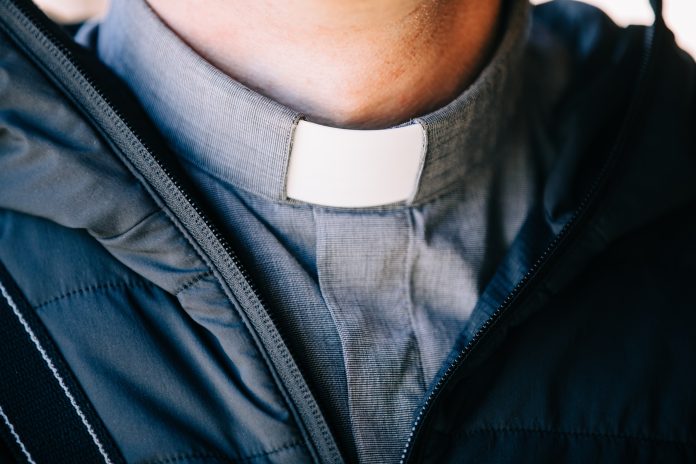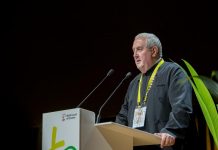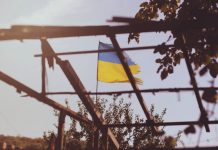On Sept. 3, 2001, Fr. Aidan Troy set off with a group of children in the Ardoyne district of north Belfast walking to their Catholic school. To reach it, they had to pass through a Protestant area.
Troy, a Passionist priest from Dublin, had recently arrived in Northern Ireland from Rome. He was about to undergo a baptism of fire.
“We set off on Sept. 3 and they asked me to walk with them. And it was horrendous,” he recalled.
Protesters attempted to block the road leading to the school, forcing girls as young as four to run a terrifying gauntlet, with the help of the police, backed by the British Army. The children and their parents were showered with jeers and sectarian abuse, as well as stones and bottles.
The incident caught the attention of the global media and shocked observers because it occurred after the 1998 Good Friday Agreement, which many thought had ended the Troubles that had raged since the late 1960s.
“Looking back now, I think that the community living near the school — we’ll call them the unionist community — had reached a desperation point, where they felt that nobody really cared, and that there was nobody to defend their rights against their fears,” Troy told CNA.
“Their fears were very, very real: they were afraid that their houses would be attacked and taken over. There was a big shortage of housing. They had very little leadership.”
“Therefore when they ran out of options, they said, ‘The only way we can do this is that the perceived enemy is the nationalist community in Ardoyne, and they are bringing their children up and down to school. If we can disrupt that then we’re going to at least get some attention, and we may be able to do something about it.’ So they blocked the road.”
As the new local pastor, Troy had been appointed chair of the board of governors of Holy Cross Girls’ School. Tensions had flared around the school in June, before his arrival. As pupils prepared to return after the summer vacation, the priest had asked parents what they wanted to do. They told him they wished to bring their children to school via the front gate, and he agreed to lead them.
On the second day, there were more ugly scenes. On the third, protesters threw a blast bomb — an improvised explosive device — towards the children and their parents. The children scattered in all directions while Troy held up his arms, urging parents not to panic.
Troy recalled that he was prepared to die rather than abandon the children.
“When I went back to Dublin, people used to say to me: ‘You’re mad. What in the name of God are you doing going up and down that road with those children?’ And they were throwing urine, this and that, and all sorts of terrible things. But you believed that those children were going to grow up and they were either going to know that they were as good as the next or they weren’t,” he said.
He added: “The bishop gave me a terrible tough time. He wanted me to tell the parents to bring them in through the back gate. And I said, ‘Well, if you’re telling me to do that, I’m taking the train back to Dublin tomorrow.’”
Troy feared most that if he backed down, then paramilitary groups would step in.
He said: “No one will ever know, thank God, but some of the paramilitaries might have taken it over and then it would have ended in bloodshed. And that’s what kept me walking, because I said: ‘This can be solved.’”
With the situation deteriorating, Troy realized that the two communities needed to find a communication channel. But reaching out might be regarded as an act of betrayal and, besides, it wasn’t clear who to talk to among the protesters.
Nevertheless, the priest began speaking to unionist leaders.
“And then some of the protesters were invited in, and they were terrible meetings. They were so bad, because the animosity, particularly against me as a Catholic priest, was horrendous,” he said.
“We stuck at it, and eventually, I remember handing over my mobile number to them and saying: ‘This is ridiculous. We keep meeting every two weeks. The children are suffering. You’re suffering.’”
The two sides met separately with politicians at Stormont, the Parliament Buildings in Northern Ireland. Slowly, a plan was formulated that would end the protests.
“On Nov. 23, 2001, the local community in Glenbryn had a meeting and by a very narrow majority, I believe, they agreed to suspend the action of blockade,” he said.
It would take two years to iron out the protocols enabling the girls to walk the route to school.
“Bit by bit by bit, it died down,” Troy recalled. “There was the occasional flare-up. Maybe at the beginning of the school year in September there would be a pipe bomb at the school gate. I know it sounds blasé, but that was minor in comparison to what we’d come through.”
Troy aimed throughout to ensure that no one felt that they were either a victor or a loser.
Speaking of the protesters, he said: “I had actually got to know one or two of them sort of by sight, and occasionally, just to nod to them and say hello. And one of them, his sister died very suddenly. Through the clergy I found his phone number and I called him and expressed my sympathy. Well, he didn’t know what to say and he didn’t know what to do.”
“That’s what I mean by saying, never rub salt in the wound and say: ‘This is a battle to the death till one side or the other wins.’”
“Now, I’m a football supporter. In sport, a draw’s no use. You have to win. But in reconciliation, you have to find a higher level, and that is where both sides can go on living, even though one side is right and one side is wrong.”
Only a minority of those involved in the conflict — both Catholics and Protestants — were weekly church-goers, Troy said, but nevertheless they were all shaped by Christianity.
“There was a sort of allegiance — even if it was only like a folk memory — to a higher value, which was the kingdom of God in some sense, of a church, a spiritual thing, and I could use that quite significantly,” he noted.
“When I was talking to them in the school hall, I could actually appeal to them morally. And that, I think, is a very powerful thing. It won’t always be a Christian thing. It won’t always be a very religious thing. But I do think you need to be able to lift the argument beyond where the argument started, or else it can never end.”
He added: “I found that Christianity was the platform that I used. I wore my habit every day. I never denied who I was. If they were going to kill me, they knew who they were killing.”
Today, almost 20 years on, Troy is pastor of St. Joseph’s, an English-speaking Catholic parish in Paris. He told CNA that he had been following the unrest in the United States after the killing of George Floyd in May. He was struck by both the similarities and differences to what he experienced in Belfast.
The 74-year-old priest said that between law enforcement and the government, on one side, and protesters, on the other, there needed to be a third group.
“You need within that somewhere — I don’t know who they would be, they might be religious people — somebody doing a little bit of what we were doing: talking across the divide,” he explained.
He continued: “The biggest thing of all in those situations is to keep listening and watching. And if you see a glimmer of light — it might be the most insignificant-looking thing — maybe that’s the breakthrough.”
“I don’t know enough to speak with any sort of certainty. But it breaks my heart to see what’s happening because it’s the exact same as Holy Cross in that sense: there are no winners in this.”
“Most of all, you need somebody with a prophetic voice. And oftentimes within any community there are prophets. And if we could find that, it’s extraordinary,” he observed.
Troy, who lived in the U.S. for two years in the 1980s while studying at the University of San Francisco, said that the deep historical roots of the unrest made reconciliation difficult. But he was hopeful because there was an “underlying spiritual awareness” in America.
“This is such a long-standing and such a deep issue that it is going to take a huge amount. But something has to be done to defuse the level it’s at the moment. It’s just terrible, night after night,” he said.
He recalled that peace only came to Northern Ireland after politicians dared to do “the unthinkable.” He gave the example of John Hume, the former SDLP leader who died Aug. 3, deciding to hold talks with Sinn Féin president Gerry Adams.
“That would be like asking the leaders of the protesters to talk to Donald Trump personally,” he said. “Somebody has to make a big move.”
He added: “If there’s any lesson out of Northern Ireland, it was that if everybody had stayed where they were then we would still be pouring blood down our streets, bombs would still be going off, and people would still be living in absolute misery at what was going on.”















